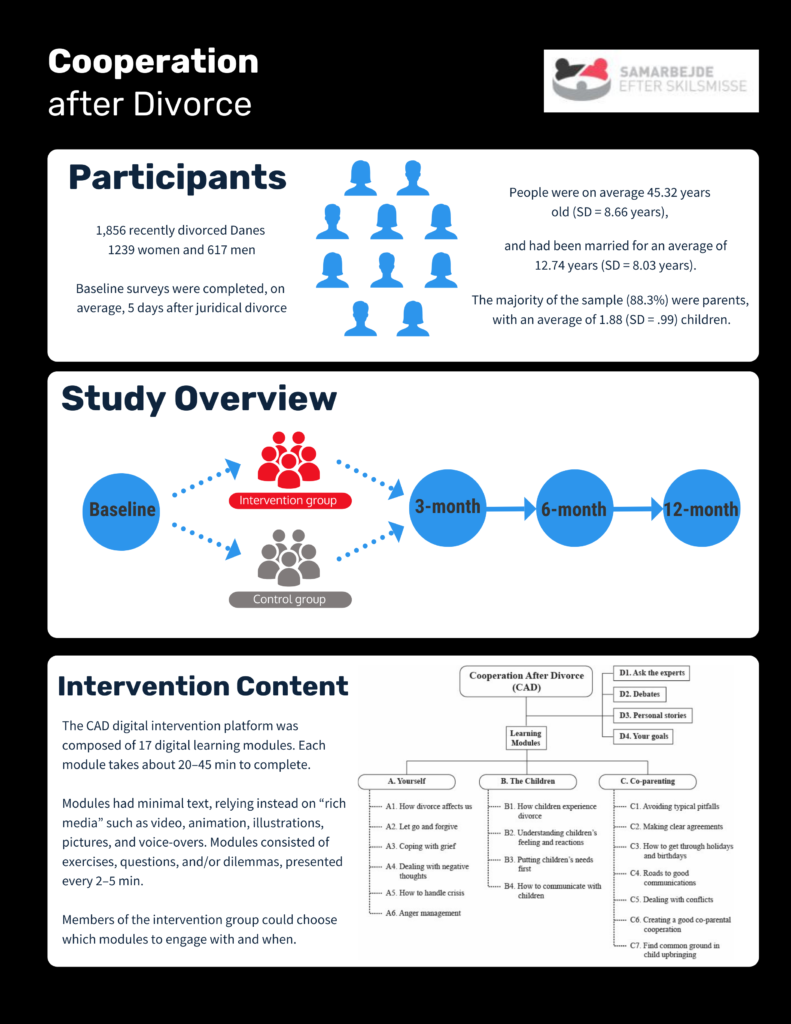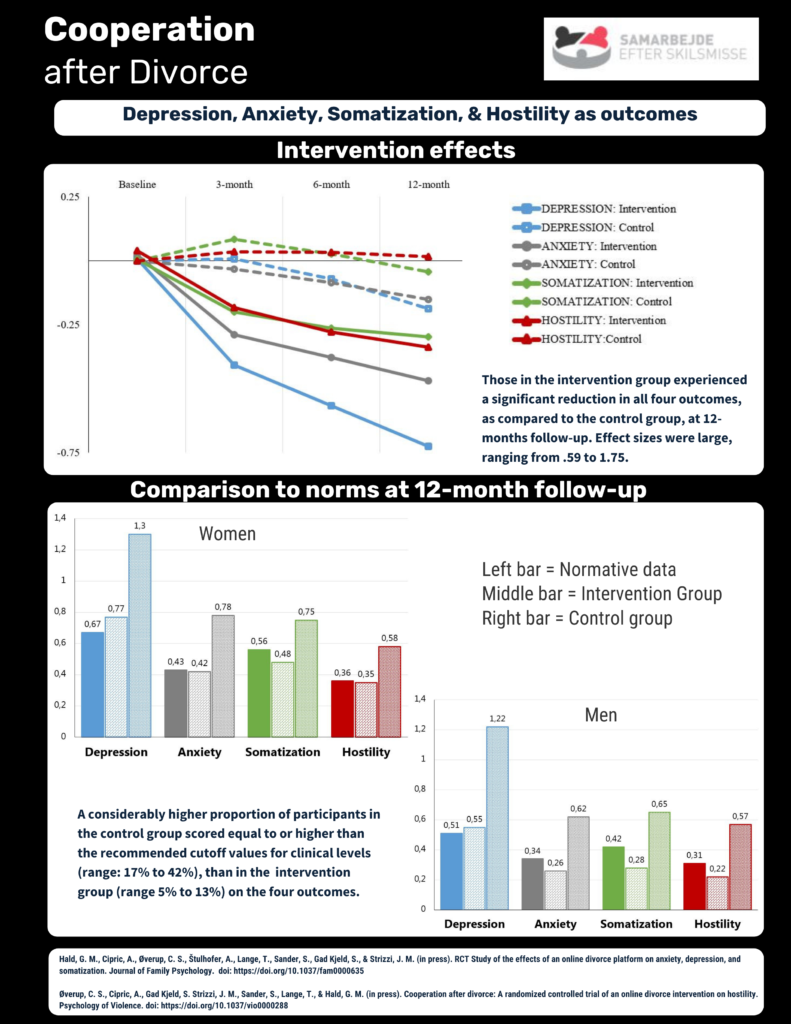RESEARCH PROJECTS
Cooperation after Divorce 
This project sought to develop an intervention to help newly divorced Danes tackle the challenges that comes with a divorce. Denmark has a divorce rate of approximately 45%, and many families are affected by divorce and its challenges. For this reason, there was a call for an evidence-based and cost-effective initiative to counteract many of the well-known negative consequences for both adults and children. The intervention program (and online platform) is called Cooperation after Divorce, as is the research project that sought to examine the effect of the intervention using a randomized controlled trial design.
The research project recruited 1,865 Danes, some of whom received access to the intervention program (intervention group) while others received ‘treatment as usual’ (that is, no access to the intervention program; control group). The study revealed that Danes who were assigned to the intervention group reported reduced stress, depression, anxiety, somatization, and hostility, and improved physical and mental well-being 12-months post divorce.
Project Status



Publications
- Strizzi, J. M., Cipric, A., Sander, S., Hald, G. M. What makes divorce stressful? Submitted for publication at Journal of Family Issues.
- Strizzi, J. M., Koert, E., Øverup, C. S., Ciprić, A., Sander, S., Lange, T., Schmidt, L., Hald, G.M. (2020). Examining Gender Effects in Post-divorce Adjustment Trajectories over the First Year after Divorce in Denmark. Submitted for publication at American Psychologist.
- Sander, S., Strizzi, J. M., Øverup, C. S., Ciprić, A., & Hald, G. M. (2020). When Love Hurts – Mental and Physical Health among Recently Divorced Danes. Accepted for publication at Frontiers in Psychology: Personality and Social Psychology.
- Øverup, C. S., Cipric, A., Gad Kjeld, S., Strizzi, J. M., Sander, S., Lange, T., & Hald, G. M. (Online First). Cooperation after Divorce: An RCT study on the Effects of an Online Divorce Intervention Platform on Hostility. Psychology of Violence. doi: 10.1037/vio0000288
- Hald, G. M., Cipric, A., Øverup, C. S., Štulhofer, A., Lange, T., Sander, S., Gad Kjeld, S., Strizzi, J. M. (Online First). Randomized controlled trial study of the effects of an online divorce platform on anxiety, depression, and somatization. Journal of Family Psychology. doi: 10.1037/fam0000635
- Hald, G. M., Ciprić, A., Sander, S., & Strizzi, J. M. (Online First). Anxiety, depression and associated factors among recently divorced individuals, Journal of Mental Health. doi: 10.1080/09638237.2020.1755022
- Sander, S., Hald, G. M., Cipric, A., Øverup, C. S., Strizzi, J. M., Gad Kjeld, S., & Lange, T. (2020). An RCT Study of the Effects of a Digital Divorce Platform on Mental and Physical Health. Applied Psychology: Health and Well-Being, 12(3), 863-886.
- Gad, S K., Strizzi, J. M., Øverup, C. S., Cipric, A., Sander, S., & Hald, G.M. (2020). Friend or Foe? Post Divorce Hostility among Recently Divorced Individuals. Aggressive Behavior, 46(6), 523-534.
- Cipric, A., Strizzi, J. M., Øverup, C. S., Štulhofer, A., Lange, T., Sander, S., Gad Kjeld, S., Hald, G. M. (2020). Cooperation after Divorce: An RCT Study of the Effects of a Digital Intervention Platform on Self-Perceived Stress. Psychosocial Intervention, 29(2), 113-123. doi: 10.5093/pi2020a7
- Hald, G. M., & Ciprić, A., Strizzi, J. M., & Sander, S. (2020). “Divorce burnout” among recently divorced individuals. Stress and Health, 36(4), 457-468. doi: 10.1002/smi.2940
- Hald, G. M., Strizzi, J. M., Ciprić, A., & Sander, S. (2020). The Divorce Conflict Scale. Journal of Divorce & Remarriage, 61(2), 83-104. doi: 10.1080/10502556.2019.1627150
- Strizzi, J. M., Sander, S., Ciprić, A., & Hald, G. M. (2019): “I Had Not Seen Star Wars” and Other Motives for Divorce in Denmark. Journal of Sex & Marital Therapy, 46(1), 57-66. doi: 10.1080/0092623X.2019.1641871